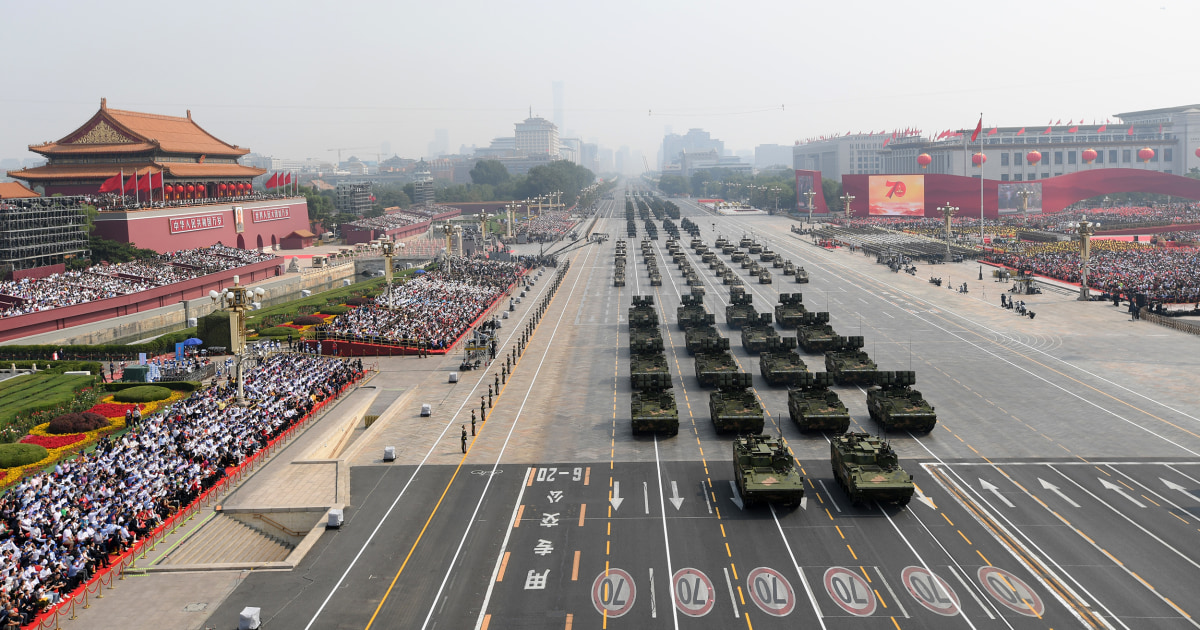Meanwhile, there's a renewed commitment to communist ideals driving China even further away from the West, economically at any rate.
Capitalist Smackdown Sparks a $1 Trillion Reckoning
After 40 years of allowing the market to play an expanding role in driving prosperity, China’s leaders have remembered something important — they’re Communists.
Xi Jinping smiled and hinted at a policy bombshell that would soon
roil stock markets from Shanghai to New York.
It was mid-June, and the most powerful Chinese Communist Party leader since Mao Zedong was holding court at an after-school club for elementary students in the remote city of Xining. Acknowledging the growing pressure on students and their parents to spend time and money on private tutoring, Xi promised to ease their burden.
“We must not have out-of-school tutors doing things in place of teachers,” he said. “Now, the education departments are rectifying this.”
While Xi’s comments went largely unnoticed by global investors at the time, the
crackdown on tutoring companies that followed has become the starkest illustration yet of the Chinese president’s commitment to a sweeping new vision for the world’s second-largest economy — one where the interests of investors take a distant third place to ensuring social stability and national security.
Call it progressive authoritarianism. From exhausted couriers in the gig economy, to stressed parents struggling with ever-rising housing prices and tuition fees, to small businesses battling tech monopolies, Xi is swinging the cudgel of state power in support of the squeezed middle class. These challenges aren’t unique to China, but the policy response has been.
Weeks after Xi’s school visit, China said private education had been “hijacked by capital” and ordered tutoring companies to become non-profits, accelerating a selloff that at its most extreme erased $1.5 trillion from Chinese stocks and dented the portfolios of some of the
biggest names in global finance.
Combined with new requirements for
data security reviews ahead of overseas IPOs,
directives for food-delivery firms to pay staff a living wage and escalating
curbs on unaffordable housing, the tutoring crackdown has triggered a growing realization that the old rules of Chinese business no longer apply, and left investors wondering which sector will be the next target for regulators.
For decades, even as they kept strict control over strategic sectors like banking and oil, China’s leaders gave entrepreneurs and investors freedom to drive the adoption of new technologies and open up fresh opportunities for growth. Deng Xiaoping set the tone back in the mid-1980s when he said it was OK if some got rich first. Now, with growth slowing and relations with the U.S. increasingly hostile, they’re emphasizing different goals: common prosperity and national security.
“This marks a watershed shift in China’s policy priorities,” said Liao Ming, Beijing-based founder of Prospect Avenue Capital, which manages $500 million. “The government is going after industries that are creating the most social discontent.”
And, true to their Communist roots, China’s leaders have no problem trampling on the interests of venture capital, private equity or stock investors when they conflict with its long-term development plan. Liao said that focus is now on what has been dubbed the “three big mountains”: the crushing burden of payments for education, healthcare and property.
For now, tech is still the main target. In a
flurry of action Friday, authorities summoned the country’s largest technology companies for a lecture on data security, vowed better oversight of overseas share listings and accused ride-hailing companies of stifling competition.
New Development Phase
China this year began a “
new development phase,” according to Xi. It puts three priorities ahead of unfettered growth:
- National security, which includes control of data and greater self-reliance in technology
- Common prosperity, which aims to curb inequalities that have soared in recent decades
- Stability, which means tamping down discontent among China’s middle class
If Xi executes on his vision — and that is still a big if — there will be important beneficiaries: stretched workers, stressed parents, and squeezed start-ups.
But so far, the losers have been more visible: tech billionaires and their backers in the stock market, highly leveraged property companies including
China Evergrande Group, and foreign venture capital firms that had hoped to take Chinese companies public in the U.S.
For international investors, many of whom got burned by this year’s regulatory onslaught, the old rule was that to make money in China it was necessary to align with the Communist Party’s priorities. The dawning realization is that finding common ground may be increasingly hard to do.
Companies and investors have been “behind the curve” when it comes to anticipating regulation in China, Ren Yi, a Harvard-educated social media commentator known as Chairman Rabbit, wrote in an online commentary that has received more than 100,000 views. Education researcher Feng Siyuan says investors should have seen the education regulations coming: Xi had said more than two years ago the sector shouldn’t be profit driven.
Part of Xi’s motivation is desire for popular support ahead of the once-in-a-decade leadership transition next year, where he is expected to buck tradition and
stay on as party chief for a third term. Growing discontent, including sporadic strikes among delivery workers, have rattled the stability-obsessed party.
Wearing the distinctive yellow shirt of Chinese delivery service
Meituan, whose profits have boomed during the pandemic, 22-year-old motorbike courier Mr. Tang complains about the lack of medical insurance. “There’s nothing I can do about it if Meituan doesn’t pay for it,” he added. “The wealth gap between people in this society is too big”.
The downside for investors is that a bigger slice of the pie for workers like Mr. Tang has to come at the expense of the owners of capital. Meituan
lost as much as $63 billion of market value last week after Beijing ordered it to improve worker protections.
China’s leaders won’t be shedding tears for the losses of foreign stock holders. The bigger risk for Beijing: Heavy state intervention might dampen the animal spirits that drive private investment and reverse an integration with the global economy that has helped drive growth in the last four decades.
Tech Trauma
Following the logic of the prison yard, Beijing signaled the start of the new era for entrepreneurs and investors by taking a swing at the biggest inmate:
Alibaba Group Holding Ltd. founder Jack Ma. On Nov. 3, the initial public offering of
Ant Group Co. — the finance arm of Ma’s empire, which was set to surpass Saudi Aramco as the biggest public listing of all time — was unceremoniously squashed.
The regulatory pace intensified after December, when a top economic planning meeting chaired by Xi vowed to rein in the “disorderly expansion of capital,” signaling the move against Alibaba was part of a wider campaign backed by the apex of Chinese power.
At first, investors thought the phrase referred to anti-monopoly efforts aimed at shrinking the power of tech giants, which had converted their vast profits into venture-capital investments spanning almost every sector. That narrative was bolstered by the
18.2 billion yuan fine slapped on Alibaba by anti-monopoly authorities in April.
But developments in recent weeks suggest the slogan goes further. In some sectors, private capital, especially foreign capital, may not be wanted at all.
At the start of July, China’s cybersecurity regulator said tech firms with more than a million users would need to pass a review before listing overseas. Regulators made an example of
Didi Global Inc — China’s answer to Uber — which had squeaked through a U.S. IPO just before the new regulations, removing it from app stores in the country and
hammering its valuation.
Later that month, China’s top administrative body, the State Council, ordered companies teaching the school curriculum in the $100 billion after-school tutoring sector to become non-profits and banned them from pursuing IPOs or taking foreign capital. The semi-legal
Variable Interest Entity, or VIE, structure adopted by the likes of Alibaba to go public abroad was singled out for top-level criticism for the first time.
While investors in the tutoring sector — a focus of major funds from Temasek to Warburg Pincus — lamented the new rules, many Chinese parents welcomed them.
Beijing is betting that the gravitational pull of an economy that will likely continue to generate more billions of dollars of growth opportunities than any other gives them leeway to throw their weight around, even if some global investors get whacked in the process.
At least some of the evidence suggests they might be right. Foreign investment continues to flow into China, including through domestic bond and stock markets which continue opening to overseas capital. For all the talk of decoupling,
China’s exports to the U.S. keep rising.
Still, structural shifts in policy have a slow burn impact. The benefits of pro-market reforms culminating in China’s 2001 entry to WTO played out over the best part of a decade before the 2008 financial crisis halted the export boom. The costs of Beijing’s new turn away from the market will also take time to show. Even if the Communist Party continues to deliver on growth, the focus on common prosperity suggests investors will have to settle for a smaller share of the spoils.
China’s leaders have remembered something important — they’re Communists.

www.bloomberg.com











